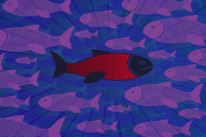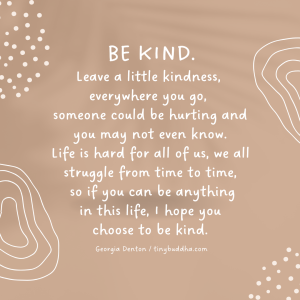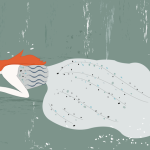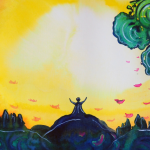
“When someone throws you a stone, throw back a flower.” ~Gandhi
“Ouch,” I cried out instinctively as my husband, Barry, and I walked through the beach parking lot, barefoot. It was only when Barry turned to me and asked me why I yelled out that I realized it was him who stubbed his toe, and not me.
“Because it hurts,” I answered him. He looked at me curiously and said, “But it didn’t hurt you. It hurt me. I’m the one who stubbed my toe.”
It hadn’t dawned on me that feeling other people’s pain wasn’t a “normal” reaction.
All my life I have been extremely empathic, but for the first half of my life I didn’t even realize that this was a unique character trait, that not everyone shares.
When I was in close contact with people who were yelling, I would literally shake. When those around me were sad or scared, I would drink in those feelings like a sponge, not realizing that these feelings weren’t my own.
As a result, I felt on edge a lot of the time, as I was carrying not only my own feelings but also the emotions of many people around me. However, I was not in touch with this anxiety—I didn’t even know it was there. It was unconscious.
Because I was empathic, I was often sympathetic to the plights and concerns of friends and family.
Even as a child, people turned to me for guidance in resolving their problems. At the time, I didn’t mind because I was happy to offer whatever support I could.
However, as I entered my teen years, the burden of other people’s emotions, on top of my own unresolved feelings, became too heavy to bear. But I didn’t know that consciously. I wasn’t even aware of what was happening for me.
I turned to food, alcohol, and other substances to numb the intensity of what I felt.
I felt a strong need to withdraw and I could no longer be in the same room or the same house with people who carried intense, often unconscious, emotions.
I had to learn ways to manage the emotional energy—both my own feelings as well as the energy of others—that I was absorbing.
This was a major key for me in breaking free from food and all other addiction. There were many bumps along the road as I learned to do this. Over time, I discovered four powerful ways to help manage emotional energy.
1. Practice awareness.
I noticed that if I wasn’t aware of what I was feeling, either in response to an internal shift, such as a hormonal or mood change, or a reaction to another person’s strong emotion, I was much more likely to be reactive and act out in a way that wouldn’t feel good to me.
With awareness, I could consciously choose a response and an action that I could feel good about.
2. Understand the nature of energy.
A big key to healing for me has been the understanding that my response to my environment also feeds the energy. Therefore, if someone throws me a stone and I throw another stone back, or worse, a rock, I am going to exacerbate the problem.
Not only will I add fuel to the fire and cause pain for the other, but I will be increasing my own suffering. Energy feeds on energy.
If my daughter comes home from a long day at school expressing negativity, if I feed on that, consciously or unconsciously, by being in any way critical, negative, or judgmental myself, I will only increase the dark energy that is now in the kitchen.
Instead, if I can give her love and sweetness, most likely that will be healing to her and the energy will shift to something that’s supportive and healing for both of us. That’s because love is all the soul seeks and when we can come back to a loving place, everything else in life becomes manageable.
When we drift from a place of love, kindness, wholeness, and forgiveness, we feel “out of sorts” and often express bad energy (anger, fear, complaining, etc.).
3. Don’t take anything personally.
One of the main reasons I came to see that I absorbed and hung on to other people’s dramas and intense energies is because I bought into their suffering at some level. But over time I realized that nothing means what I think it does.
I don’t have to force open the caterpillar’s cocoon to help it become a butterfly. I realized that the same power within me that has turned every difficulty and challenge I have faced into an ultimate lesson and blessing is in everyone else, too.
I have learned to trust that other people, even those I love the most, need to learn life’s lessons through their own experiences and insights.
I’m not responsible for fixing the energy or the situation. My only responsibility was and is how am I managing my own energy: am I adding goodness, love, and warmth to the space and people around me, or am I contributing to the creation of a frenetic and fearful environment?
4. Balance yourself.
The key to staying balanced for me is to continuously stay connected to my heart—my deeper, spiritual self—and when I stray from there by getting caught up in the voices in my head or the drama unfolding around me, to know the short-cut back to center.
For me, the most powerful way to do this is with a form of meditation that I call self-hypnosis.
This method helped me to heal so many aspects of my life, including my health, which had deteriorated at a young age, my weight, and food addiction issues as well as my relationships. Any type of meditation—and even just a few minutes of deep breathing—can help us center ourselves.
Being empathic and super sensitive to energy is not something that I can just decide to change, but I can become more aware of how it affects me.
The empowering thing is the realization that I can change my reactions and my own behaviors, no matter how overwhelming the emotions, my own and others’, feel to me, in the moment.
Because 90% of the behaviors we do are habitual—meaning we are only doing them because we did them yesterday—we can literally re-train the brain to respond in a new way to the exact same stimuli.
I used to think my only two choices were to react to negative energy with negativity or to withdraw and detach. Neither option was conducive to building strong, supportive relationships or to my own happiness.
I now know that when someone throws me a stone, I can throw back a flower (as a wise spiritual teacher once recommended), and I can feel great about it!
I wouldn’t change my empathic nature even if I could because, on a positive note, it has helped me to understand people and open my heart to them—to realize that we are all on the same human journey together, seeking compassion and love, even if we’re not going about it in the most effective way.
Every cloud has a silver lining, and the blessing of empathy and feeling emotions strongly is the opportunity to connect to our deepest strength and transmit something greater that can bring healing to our self and others.
About Rena Greenberg
Rena Greenberg can be reached at http://EasyWillpower.com. Her success with weight loss hypnosis has been featured in 150+ news stories including USA Today, Woman’s World Magazine, The Doctor’s Show, CNN, Good Morning America and ABC-TV Nightline. Her wellness program has been sponsored in 75 hospitals and 100+ major corporations. She’s the Author of The Right Weigh and The Craving Cure.













 Though I run this site, it is not mine. It's ours. It's not about me. It's about us. Your stories and your wisdom are just as meaningful as mine.
Though I run this site, it is not mine. It's ours. It's not about me. It's about us. Your stories and your wisdom are just as meaningful as mine. 
ytdyte
HAY GAYZ??????
….Cool Income only copy paste by tinybuddha < www.ShiftJob9.com
< ✜✱✪✪✲✜ +tinybuddha +*********….. < Start working at home with Google! It’s by-far the best job I’ve had. Last Wednesday I got a brand new BMW since getting a check for $6470 this – 4 weeks past. I began this 8-months ago and immediately was bringing home at least $177 per hour. I work through this link,
>/
< ✜✱✪✪✲✜ +tinybuddha +*********….. < Start working at home with Google! It’s by-far the best job I’ve had. Last Wednesday I got a brand new BMW since getting a check for $6471 this – 4 weeks past. I began this 8-months ago and immediately was bringing home at least $177 per hour. I work through this link,
>/
What great tips, Rena! I feel your pain 🙂 Your # 3 especially works for me! Once I finally realized I wasn’t expected to save the world (LOL), I could set clearer boundaries.
Thank you for all of these!
Great advice Rena. I’m delighted for you that you worked out how to build strong, supportive relationships and prioritize your own happiness while getting your responsibility in perspective. Thanks for sharing your post and your strategies.
I sat at my desk and read this in tears. Thank you for the inspiration and tools to turn a “weakness” into a strength!
Thank you for the beautiful insight! I am trying to get better at managing my empathy but it is physically and emotionally draining
I just started therapy to deal with this exact problem! My son was just diagnosed with Autism and add that to my overwhelming anxiety and empathy issues, I’m falling apart! I really needed this read, thank you!
Great article, are you sure you didn’t have my experiences in mind? I’m also highly empathetic and sensitive, for example when others scream at each other next to me I literally shake and want to run away, when someone is angry – I immediately become angry as well, even if it has nothing to do with me. Sometimes I feel that being empathetic is a wonderful character trait and a really heavy burden to carry.
That’s why I’m so grateful for your article, so many brilliant ideas ! Thank you!
I have described this level of empathy as my being born without skin. Others have observed that I am like a satellite picking up everyone elses signals. I feel I need to take it everywhere with me; a reminder that my job is not to report on others’ journey or feel their pain at the same level they are projecting. Being present does not require me to bear others’ despair along with them. Such an insightful article.
AMEN SISTER!!
Thank you so much, Natalia! I agree–being emotionally sensitive is a beautiful gift and at times, can be a challenge. I’m so glad to hear that my article and the tools to embrace this aspect of yourself, resonated with you.
Thank you, Zelda! I hope the tools in the article will help you to feel less drained. All the Best!
Thank you, Sarah! Many blessings to you!
Thanks, Susan! Yes, what a relief it is to discover that not everything is personal – it just is, and we don’t have to react to it! That’s great that you’re now setting boundaries that work for you. Warmly, Rena
Thanks, Anna!
Hi Zepha,
I love how you put that – “I don’t have to feel their pain at the same level they are projecting.” That’s a beautiful realization. For me, it can be helpful to feel just enough to have and express compassion, but not so much that it is effecting your own energy. Thanks for sharing, Zepha!
Thanks for sharing Jen. I am so sorry to hear that this is a difficult time for you. I wish you many blessings and much grace on this journey with your son. It has helped me so much, as a parent, to remember that within my children is an infinite power that protects them from all harm, that blesses and sustains them (despite external appearances that seem contrary). For me, faith and having a practice of looking at each situation through the eye of my heart has been immensely helpful.
All the Best! Rena
Thank you, Laura! I appreciate your kind words!
< ?????? +dilbert +*********…..
15
Thank you, thank you! This was exactly what I needed to read today. Could you recommend some resources on self-hypnosis or any other ways to reclaim my calm?
I’ve fallen apart many times and know what you mean. I also have a son, though not diagnosed with Autism, he is extremely strong willed and its been difficult combined with my own sensitivities. I’ve come to believe these child/parent pairings are often (maybe always?) perfect pairings in their own way. The stronger the challenge the greater the reward in terms of internal growth and progress. You’ll get where you need to be, just don’t stop loving and believing 🙂
This was exactly what I needed to read! Do you have any recommendations as far as resources for self-hypnosis techniques or anything else that might help me regain my calm?
Thank you for the article. I have found that just a few minutes of meditation a day helps me balance out too. My problem is that when I’m very weighed down by unbalanced/unreleased energies it feels like being pinned down as if by ocean waves, knowing in my mind what needs to be done yet my other senses in a trance, almost autopilot. It’s hard to explain, but its overwhelming. Meditation releases me from this “hold” nearly 100% of the time. The key is to make it a habit as its like exercise, its not a one time cure. You hit on several other points related to being overwhelmingly empathic and I love how you shared some of your own struggles growing up (I relate to those as well!).
This article is a great way of being resilient to negative energies. Thanks for your perspective!
Metaphorically speaking of course, I have been throwing cart-fulls of flowers recently and I feel amazing. The thing is, the more you show love instead of vengeance in the world, the more connected to light you will feel. A wise friend once told me to make more decisions out of love, not fear.
For me, at least, on the rare occasion I DO throw back a stone (happens to everyone, no one is perfect) it’s like starting over and the amazing feeling you get from throwing back all those flowers goes away.
Does anyone else feel this way? You have to build up your flower-throwing skills in successive repetitions to get back to that amazing state.
< ?????? +dilbert +*********…..
35
Hi Benz, thanks so much for your thoughtful comment. I agree, the more you give back flowers instead of throwing stones back, the better you are going to feel. It does get easier because you are building momentum in a positive direction. Then if you do throw a stone, instead of feeling justified as the ego often does, it becomes clear that the person you have let down the most is yourself, which gives you more motivation to get back on track, living in the garden. Thanks!
Thanks so much for your feedback. I’m glad that you liked the article. Yes, you have to reinforce meditation and self-hypnosis but it gets easier and easier the more you practice. Also, when you find a technique that resonates with you, you begin to have more carry over, where the benefits are evident in between your actual meditation or self-hypnosis sessions. The goal is to reprogram your mind so that you can react in a new way, naturally. Thanks!
< ?????? +dilbert +*********…..
16
Thank you for this article! It’s nice to see others experience what I have felt my entire life. I never knew what it was actually until a couple of years ago. It’s so emotionally and physically draining people wonder why I’m always so tired!
Heck Rena that was a great article and in fact described me and my experiences to the letter and all the causes that ensue. For me my response over recent years to drown out that incessant noise in my head has been alcohol and becoming a recluse and withdrawing from any and all forms of social contact where ever possible. As you say, neither offer any form of solution. Your words have offered me a direction of travel much more likely to succeed and I am grateful for you sharing your wisdom 🙂
>
This is a beautiful article. I read this twice to completely absorb the learning in my head…I loved point#3, like someone wrote in the comments below, I need to stop thinking that I am here to save the world. At times my personal and family problems make me feel overwhelmed. I feel that I need to participate in the pain just as much the sufferer. And without even realizing the pain becomes a part of me too! and it is a fact of life that all of us have some or the other issues going on around us all the time, if we become a part of it all, we start loosing sense of what really matters to us and what does not. But I still question myself in every situation that if I do not participate in what my loved ones are going through would it be wrong? Would I be too detached from people I love?
I do this to myself so many times! So well put ” my job is not to report on others’ journey or feel their pain at the same level they are projecting”
I am now, at the age of 44, getting that I may fall under the umbrella of what others call, “Being an Empath”. I am a man and have been spending the last 7 years or so on a crazymaking at times and painful at other times journey of sorting through decades of shtuff. Where I am now is that I most definitely am the son of a mother whose father was an alcoholic and abuser in many senses of the word. I have inherited a sort of “Emotional DNA” that is not mine to hang on to, let alone pass to my young daughter. I pick up on all kinds of shtuff.
It was about 7 years ago that I had decided I was going to make some big changes in my health. As I did, things started to shift. I started to pick up on things that seemed SO obvious to me; as obvious as my nose on my own face even! But, when I would address what I was observing, *FIREWORKS* ensued! I taught myself that I shouldn’t say or do anything when I picked up on this shtuff. HA!!! I *just* put together that THIS is exactly what I did as a child! #GoTherapy lol 😉
ANYWHO, I started to notice what I call “mismatches” in what people SAY with their MOUTHS and what their BODIES are saying. I started to pick up ‘vibes’ and had no idea what they were let alone what I was supposed to do with them! I spoke with my Docs and not only got “green lights” but also “thumbs up”. “Trust your Gut”, I was told.
I have friend who was helping me sort through attempting to return to one of my communities post-divorce. I was sharing how I felt as if I was walking in an emotional landmine; that I could FEEL others’ awkwardness in welcoming me back. Her words? “It’s not yours to absorb.” Save my Life 😉
I needed to read this exactly today. Thank you.